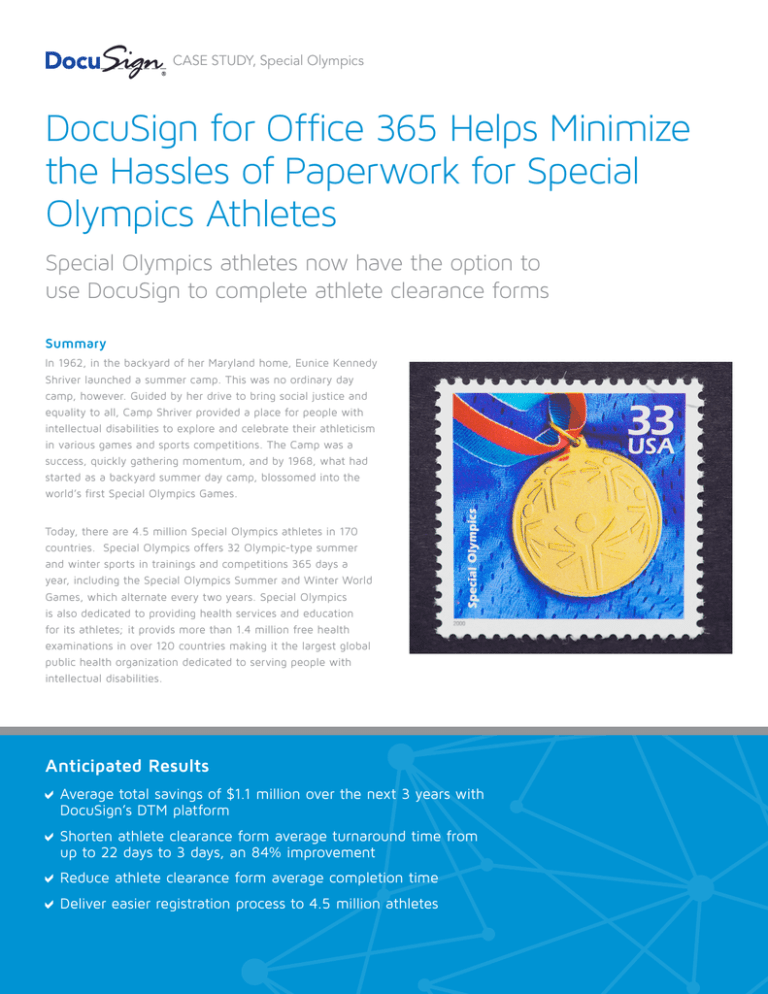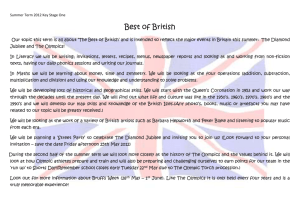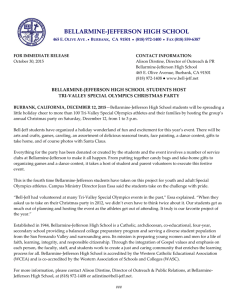
CASE STUDY, Special Olympics
DocuSign for Office 365 Helps Minimize
the Hassles of Paperwork for Special
Olympics Athletes
Special Olympics athletes now have the option to
use DocuSign to complete athlete clearance forms
Summary
In 1962, in the backyard of her Maryland home, Eunice Kennedy
Shriver launched a summer camp. This was no ordinary day
camp, however. Guided by her drive to bring social justice and
equality to all, Camp Shriver provided a place for people with
intellectual disabilities to explore and celebrate their athleticism
in various games and sports competitions. The Camp was a
success, quickly gathering momentum, and by 1968, what had
started as a backyard summer day camp, blossomed into the
world’s first Special Olympics Games.
Today, there are 4.5 million Special Olympics athletes in 170
countries. Special Olympics offers 32 Olympic-type summer
and winter sports in trainings and competitions 365 days a
year, including the Special Olympics Summer and Winter World
Games, which alternate every two years. Special Olympics
is also dedicated to providing health services and education
for its athletes; it provids more than 1.4 million free health
examinations in over 120 countries making it the largest global
public health organization dedicated to serving people with
intellectual disabilities.
Anticipated Results
Average total savings of $1.1 million over the next 3 years with
DocuSign’s DTM platform
Shorten athlete clearance form average turnaround time from
up to 22 days to 3 days, an 84% improvement
Reduce athlete clearance form average completion time
Deliver easier registration process to 4.5 million athletes
Challenge
Solution
As Special Olympics grows, one of the challenges it faces is
finding a way to efficiently manage the organization’s heavy
paper traffic. From important athletic forms, HR paperwork
like offer letters and contracts, and financial paperwork like
procurement and check requests, Special Olympics processes
nearly 800,000 sheets of paper each year. At this volume,
countless administrative hours must be dedicated to creating,
printing, distributing, tracking, and archiving paper, all of
which contributes to significant annual hard-dollar spending.
Special Olympics began investigating digital alternatives to
its paper processes. “We realized that if we could use cloud
technology to store and transact documents digitally, our
athletes would always have access to their files no matter
where they were,” says Broadwater.
Among the most important documents Special Olympics
processes are athlete clearance forms. These forms, which
must be updated every three years, require the signatures
of athletes or guardians, and doctors to ensure that athletes
are in proper physical condition to compete. These athlete
clearance forms must be presented at every practice and
competition in order for athletes to participate. Because the
number of athletes who compete in Special Olympics Games
has increased exponentially over the years, maintaining
an efficient management system for these forms has
become challenging.
“When you consider that we have 4.5 million athletes
worldwide, and that each athlete must have both a parent/
guardian release form as well as a medical release form, and
that both of those forms must be updated every three years,
and that those forms require at least three, and sometimes
four or five signatures, it’s easy to imagine how problems can
arise,” says Dave Lenox, President and CEO, Special Olympics
Washington. “On average, the turnaround time for a single
athlete’s athlete clearance form is 22 days and requires the
paperwork to change hands at least three times. That’s a
lot of time, energy, and money dedicated to a single piece
of paper. And each time it changes hands we run the risk
of losing it and having to start the process over from the
beginning.”
Special Olympics Chief Technology Officer, Noah Broadwater,
adds that the highest cost of paper comes when coaches,
volunteers, or staff lose or forget to bring required
documents with them to competitions or practice. “We would
see athletes in the United States or Africa or Europe drive
hours to compete or practice, and if they had forgotten their
paper clearance forms along the way, they wouldn’t be able
to participate.” Special Olympics began seeking a solution
that would allow athletes to sign and maintain documents in
the cloud so forgotten paperwork wouldn’t bar them from
practice and competition.
One of the solutions Special Olympics researched was
DocuSign’s Digital Transaction Management (DTM) platform.
Equipped with language support, digital and electronic
signature capabilities, and secure mobile cloud-retention of
documents, DocuSign and its integration with Office 365
emerged as a good fit for Special Olympics. The organizations
entered into a sponsorship agreement.
Special Olympics was founded on
the belief that through the power
of sports, people with intellectual
disabilities find joy, fulfillment
and confidence. With DocuSign
and Office 365, our athletes
won’t have to miss a practice or a
competition due to missing forms.
The joy that comes from the
opportunity to compete is simply
unquantifiable.”
Noah Broadwater,
Results
Going digital has enabled Special Olympics to eliminate costs
associated with paper-based processes, allowing for savings
of more than $35 per document. “These dollars are now
going back into funding our mission at Special Olympics,”
says Noah Broadwater. “Between hard-dollar savings and
productivity gains from automating processes, we are hoping
to save nearly $1.1 million over the next 3 years.”
Special Olympics is also reclaiming valuable time. “On
average, athlete medical clearance forms that used to require
15 minutes to input data now require approximately one
minute,” says Broadwater. “That’s 94% less time that we
have to spend managing paperwork, which lets us spend that
time interfacing with athletes, planning events, and doing the
things that we are really passionate about.”
Turnaround time on such forms has also decreased greatly.
Once averaging 22 days to turnaround, such forms are now
drawn up, signed, and archived in as little as three days.
“Going from 22 days down to three days is incredible – that’s
an 84% improvement over our paper process,” says Dave
Lenox. “For us, this means we know sooner that our athletes
are fit to compete, and for our athletes, it means they can
get on the field faster.”
One of the biggest impacts Special Olympics has seen by
minimizing its reliance on paper is the assurance that no
athlete will be barred from participation due to missing
paperwork. “Special Olympics was founded on the belief
that through the power of sport, people with intellectual
disabilities find joy, fulfillment and confidence,” says
Broadwater. “With DocuSign for Office 365, our athletes
won’t have to miss a practice or a competition again due to
missing forms. The joy that comes from the opportunity to
compete is simply unquantifiable.”
DocuSign® is changing how business gets done. DocuSign empowers anyone to transact anytime,
anywhere, on any device with trust and confidence. Organizations of every size, industry and
geography accelerate contracts, approvals and workflows with DocuSign’s Digital Transaction
Management (DTM) platform and eSignature solution. DocuSign keeps life and business moving
forward.
For U.S. inquiries: toll free 866.219.4318 | docusign.com
For EMEA inquiries: phone +44 203 714 4800 | emea@docusign.com | docusign.co.uk
For APAC inquiries: phone +1 800 255 982 | docusign.com.au
For LATAM inquiries: phone +55 11 3330 1000 | docyousign.com.br
Copyright © 2003-2015 DocuSign, Inc. All rights reserved. DocuSign, the DocuSign logo, “The Global Standard for Digital Transaction Management” are trademarks or registered trademarks of DocuSign, Inc. in the United States and/or other countries.
For a list of DocuSign’s trademarks, please see www.docusign.com/IP. All other trademarks and registered trademarks are the property of their respective holders.





